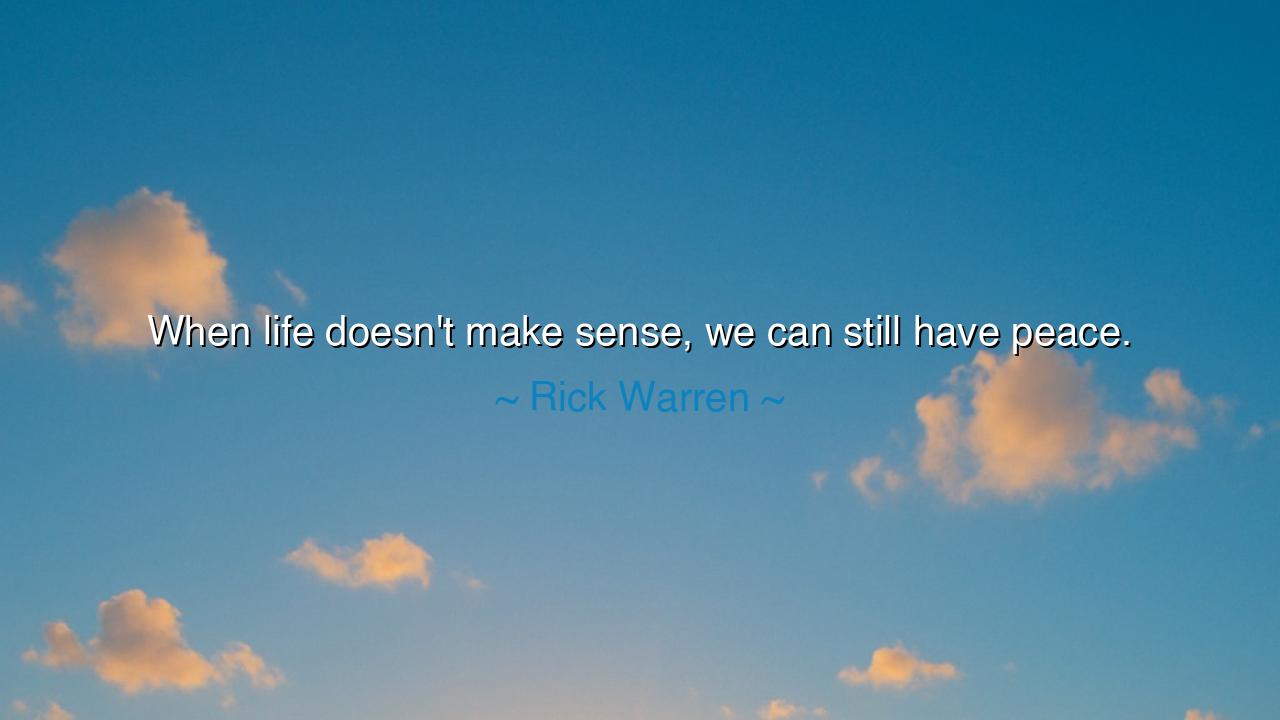
When life doesn't make sense, we can still have peace.






The words of Rick Warren—“When life doesn’t make sense, we can still have peace.”—are a balm for weary souls who walk through valleys of confusion and suffering. They speak to the eternal paradox of human existence: that the world is often chaotic, filled with sorrow, loss, and questions without answers, and yet within this storm there is a place of stillness. Warren reminds us that peace is not dependent on clarity or perfect understanding. Instead, it is a gift of the spirit, born from faith, trust, and surrender to something greater than our comprehension.
For to demand that life must always make sense is to build upon sand, for no man can fully unravel the mysteries of existence. Why do the innocent suffer? Why does death come untimely? Why does injustice thrive while virtue struggles? These questions echo through the centuries, and the wisest of sages confess they cannot answer them all. Yet, Warren’s words lift our eyes higher: though reason falters, peace can still abide. It is not the child of logic, but of trust; not the fruit of answers, but of faith.
The ancients knew this well. Job, in the scriptures, lost his children, his wealth, and his health. His friends demanded explanations, yet none were sufficient. At last, Job encountered the presence of God—not with answers, but with awe. From that encounter came peace, even without full understanding. Similarly, the Stoics taught that while man cannot control the winds of fate, he can control the harbor of his soul. Life may not yield clarity, but the soul that aligns with higher truth can find calm amidst confusion.
History also bears witness. Consider Corrie ten Boom, who suffered in the horrors of a Nazi concentration camp. Her world had no sense; evil seemed to reign unchecked. Yet in her memoirs she spoke of an inner peace that sustained her—peace that arose not from human reason, but from divine trust. Though her life was torn apart, she found serenity in believing that God’s providence reached beyond her understanding. Her testimony reveals Warren’s truth: peace is possible even in the darkest hours, when logic fails.
This wisdom warns us, too, of the danger of making our peace dependent on answers. For answers shift like the tides, but peace rooted in trust remains firm. If you wait until life makes sense to rest, you will wait forever. But if you learn to root your spirit in something greater—in God, in faith, in eternal truths—then peace will come even when reason deserts you. This is no denial of pain or confusion, but the strength to endure them without despair.
The lesson for us is clear: cultivate an inner peace that does not depend on circumstances. Life will bring trials, tragedies, and questions that no man can answer. Do not let your soul be tossed about by the demand for clarity. Instead, nurture peace through prayer, meditation, trust in God, or the discipline of stillness. Let peace be the anchor, not the byproduct of understanding.
Practically, this means pausing when confusion overwhelms, breathing deeply, and choosing not to let unanswered questions rule your heart. It means seeking strength in community, in sacred writings, in quiet reflection. It means whispering to your soul: “I may not understand, but I am not abandoned. I may not see clearly, but I can still rest.” In this practice lies freedom.
So let Warren’s words be carried in your spirit: “When life doesn’t make sense, we can still have peace.” For the world will never fully explain itself, but peace does not come from explanation. It comes from the stillness within, from the hand of God, from the trust that even when we cannot trace the pattern, the Weaver of all things is faithful. And in this peace, we may stand unshaken, even when life itself makes no sense at all.






AAdministratorAdministrator
Welcome, honored guests. Please leave a comment, we will respond soon